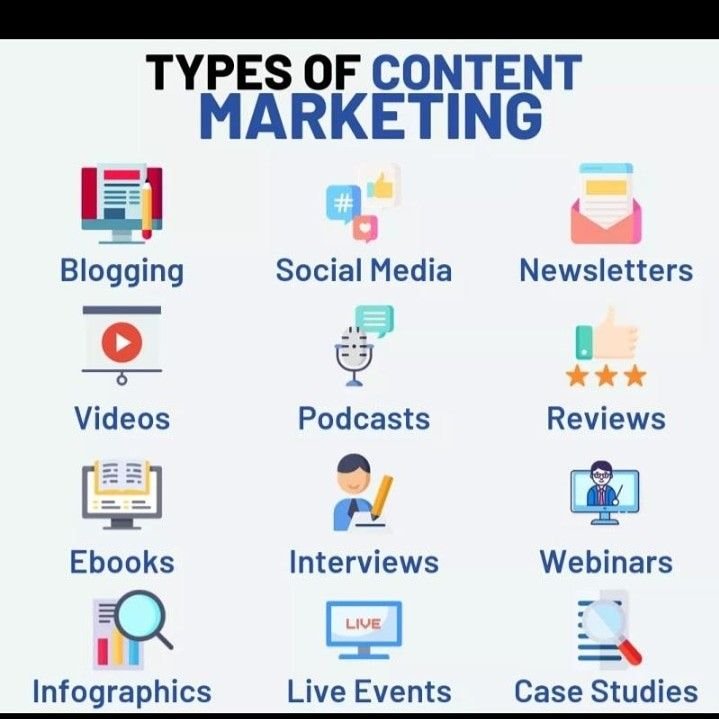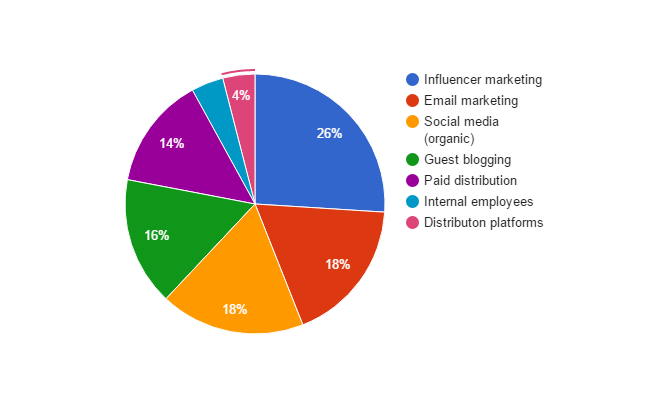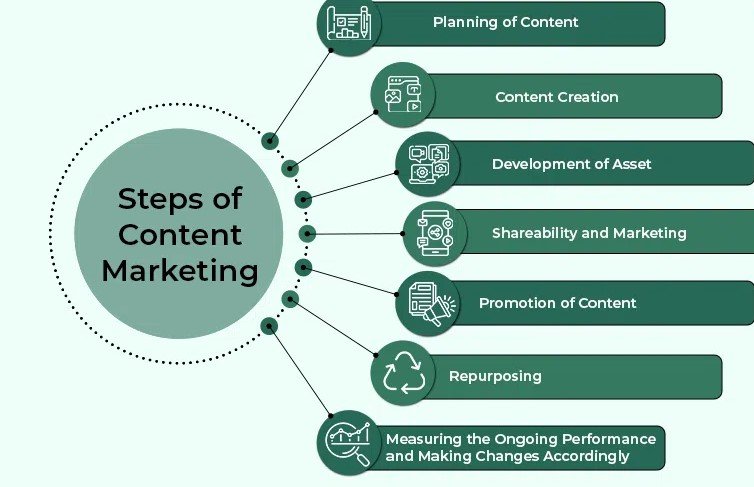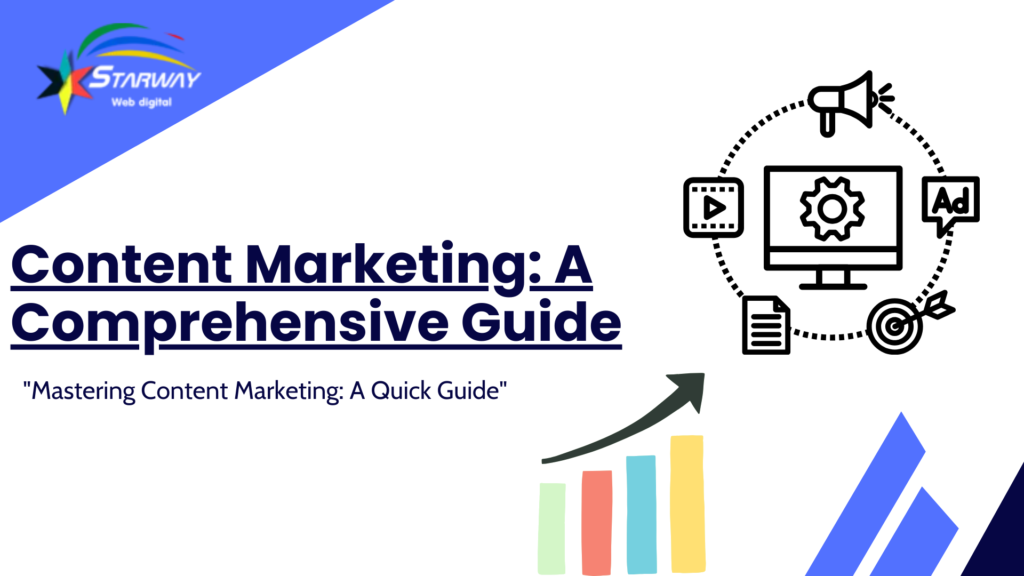In today’s digital landscape, content marketing has emerged as a crucial component of any successful marketing strategy. Businesses of all sizes are recognizing the power of compelling content to engage their audience, build brand awareness, and drive conversions. In this comprehensive guide, we’ll delve into the intricacies of content marketing, exploring its various types, benefits, strategies, and best practices to help you leverage its full potential.
Introduction to Content Marketing
Content marketing can be defined as the strategic approach of creating and distributing valuable, relevant, and consistent content to attract and retain a clearly defined audience. Unlike traditional advertising, content marketing focuses on delivering valuable information rather than directly promoting a product or service. It aims to educate, entertain, or inspire the target audience, ultimately fostering trust and loyalty towards the brand.
Types of Content Marketing

Content marketing encompasses a wide array of formats, each catering to different audience preferences and consumption habits. Some common types of content marketing include:
Blogging
Blogs serve as a platform for businesses to share industry insights, updates, and informative articles. They help establish thought leadership, drive organic traffic to the website, and improve search engine rankings through relevant keywords.
Social Media Content
Social media platforms offer a dynamic space for sharing engaging content in various formats, including posts, images, videos, and stories. Businesses can leverage social media to interact with their audience, build community, and amplify brand messaging.
Videos
Video content continues to gain popularity across digital channels, offering a visually engaging way to convey information and tell stories. From product demonstrations to behind-the-scenes footage, videos can captivate audiences and evoke emotions effectively.
Infographics
Infographics combine text and visual elements to present complex information in a digestible format. They are highly shareable and can attract attention on social media platforms, driving traffic back to the website.
eBooks and Whitepapers
Long-form content such as eBooks and whitepapers provide in-depth insights into specific topics or industry trends. They are valuable resources for lead generation, offering valuable information in exchange for contact details.
Benefits of Content Marketing

The benefits of content marketing extend beyond mere brand promotion. Here are some key advantages:
Increased Brand Visibility
By consistently publishing valuable content, businesses can enhance their online presence and visibility across digital channels. This increased visibility helps attract new audiences and expand reach.
Higher Website Traffic
Quality content serves as a magnet for organic traffic, driving visitors to the website through search engines, social media shares, and referral links. This influx of traffic can lead to higher conversions and sales.
Improved Brand Reputation
Content that demonstrates expertise, authority, and authenticity can help build a positive brand reputation. When consumers perceive a brand as knowledgeable and trustworthy, they are more likely to engage with its products or services.
Lead Generation and Customer Acquisition
Informative content acts as a lead generation tool, attracting potential customers who are seeking solutions to their problems or answers to their questions. By nurturing these leads through the sales funnel, businesses can convert them into paying customers.
Enhanced Customer Engagement and Loyalty
Engaging content fosters meaningful interactions with the audience, encouraging likes, shares, comments, and other forms of engagement. By consistently delivering value, businesses can cultivate a loyal community of brand advocates.
Key Elements of an Effective Content Marketing Strategy

To maximize the impact of content marketing, businesses need to develop a well-defined strategy that aligns with their goals and objectives. Here are some essential elements to consider:
Understanding Target Audience
Effective content marketing begins with a deep understanding of the target audience’s demographics, preferences, pain points, and aspirations. By creating content that resonates with their interests and needs, businesses can establish stronger connections and drive engagement.
Setting Clear Objectives and Goals
Before embarking on a content marketing campaign, it’s crucial to outline specific objectives and measurable goals. Whether it’s increasing website traffic, generating leads, or boosting sales, clear goals provide direction and focus for the content strategy.
Content Creation and Distribution Plan
A comprehensive content calendar outlines the types of content to be created, the topics to be covered, and the publishing schedule. It also includes a distribution plan to ensure that content reaches the target audience through various channels.
Consistency and Quality
Consistency is key to maintaining audience interest and engagement over time. Businesses should strive to deliver high-quality content on a regular basis, adhering to brand voice, style guidelines, and editorial standards.
Monitoring and Analytics
Monitoring the performance of content marketing efforts is essential for assessing effectiveness and making data-driven decisions. By tracking key metrics such as website traffic, engagement rates, and conversion rates, businesses can identify areas for improvement and optimize their strategies accordingly.
Content Distribution Channels

Effective content distribution is essential for reaching and engaging the target audience across various touchpoints. Here are some popular distribution channels:
Social Media Platforms
Share content organically on social media platforms such as Facebook, Twitter, LinkedIn, Instagram, and Pinterest. Use a mix of text, images, videos, and hashtags to maximize visibility and engagement.
Email Marketing
Send personalized content to subscribers through email newsletters, drip campaigns, and promotional offers. Tailor content based on subscriber preferences and behaviors to enhance relevance and engagement.
SEO Optimization
Optimize content for search engines by incorporating relevant keywords, meta tags, and descriptive headers. Focus on creating valuable, user-friendly content that satisfies search intent and earns higher rankings.
Influencer Partnerships
Collaborate with influencers and industry experts to amplify the reach and credibility of your content. Partner with influencers who align with your brand values and target audience demographics for maximum impact.
Content Syndication
Distribute content to third-party websites, blogs, and online publications through syndication partnerships. Reach new audiences and generate backlinks to improve search engine visibility and domain authority.
Measuring Content Marketing Success

Measuring the effectiveness of content marketing efforts requires tracking key performance indicators (KPIs) and analyzing relevant metrics. Here are some common KPIs to consider:
Key Performance Indicators (KPIs)
- Website traffic: Number of visits, page views, and unique visitors
- Engagement metrics: Likes, shares, comments, and click-through rates
- Conversion rates: Percentage of visitors who take desired actions (e.g., sign-ups, purchases)
- Return on investment (ROI): Revenue generated compared to the cost of content marketing efforts
Analytics Tools
Utilize analytics tools such as Google Analytics, social media insights, and email marketing platforms to track and analyze performance metrics. Gain insights into audience behavior, content performance, and conversion paths to inform strategic decisions.
Adjusting Strategies Based on Data Insights
Based on data insights, refine content strategies, tactics, and distribution channels to optimize performance and achieve desired outcomes. Experiment with different approaches, monitor results, and iterate based on feedback to continuously improve effectiveness.
Common Mistakes to Avoid in Content Marketing

While content marketing offers numerous benefits, certain pitfalls can hinder success if not addressed. Here are some common mistakes to avoid:
Lack of Strategy
Failing to develop a clear content marketing strategy can lead to inconsistent messaging, wasted resources, and missed opportunities. Take the time to define objectives, target audience, and key performance indicators to guide content creation and distribution efforts.
Ignoring Audience Preferences
Neglecting to understand audience preferences, interests, and pain points can result in irrelevant or unappealing content. Conduct audience research, gather feedback, and tailor content to meet the needs and expectations of your target audience.
Poor Quality Content
Publishing low-quality or hastily produced content can damage brand credibility and reputation. Prioritize quality over quantity, invest in professional writing and design, and ensure that content adds value and relevance to the target audience.
Neglecting Distribution Channels
Focusing solely on content creation without a comprehensive distribution plan can limit reach and engagement. Explore various distribution channels, including social media, email marketing, SEO, and partnerships, to maximize exposure and impact.
Failing to Measure and Analyze Results
Neglecting to track and analyze performance metrics makes it difficult to assess the effectiveness of content marketing efforts. Establish clear KPIs, implement tracking mechanisms, and regularly review analytics data to identify trends, insights, and areas for improvement.
Conclusion
In conclusion, content marketing is a powerful strategy for attracting, engaging, and converting audiences in the digital age. By creating valuable, relevant, and consistent content, businesses can build brand awareness, drive traffic, generate leads, and foster long-term relationships with customers. By understanding the key elements of an effective content marketing strategy, avoiding common pitfalls, and embracing emerging trends, businesses can maximize the impact of their content efforts and achieve sustainable growth.
FAQs (Frequently Asked Questions)
- What is content marketing?
Content marketing is a strategic approach to creating and distributing valuable, relevant, and consistent content to attract and retain a clearly defined audience. - Why is content marketing important?
Content marketing helps businesses build brand awareness, drive website traffic, generate leads, and foster customer engagement and loyalty. - How can I measure the success of my content marketing efforts?
Key performance indicators (KPIs) such as website traffic, engagement metrics, conversion rates, and return on investment (ROI) can be used to measure the effectiveness of content marketing campaigns. - What are some common mistakes to avoid in content marketing?
Common mistakes to avoid include lack of strategy, ignoring audience preferences, publishing poor quality content, neglecting distribution channels, and failing to measure and analyze results. - What are some emerging trends in content marketing?
Emerging trends in content marketing include user-generated content, interactive content, voice search optimization, personalization, and the integration of artificial intelligence and machine learning.




